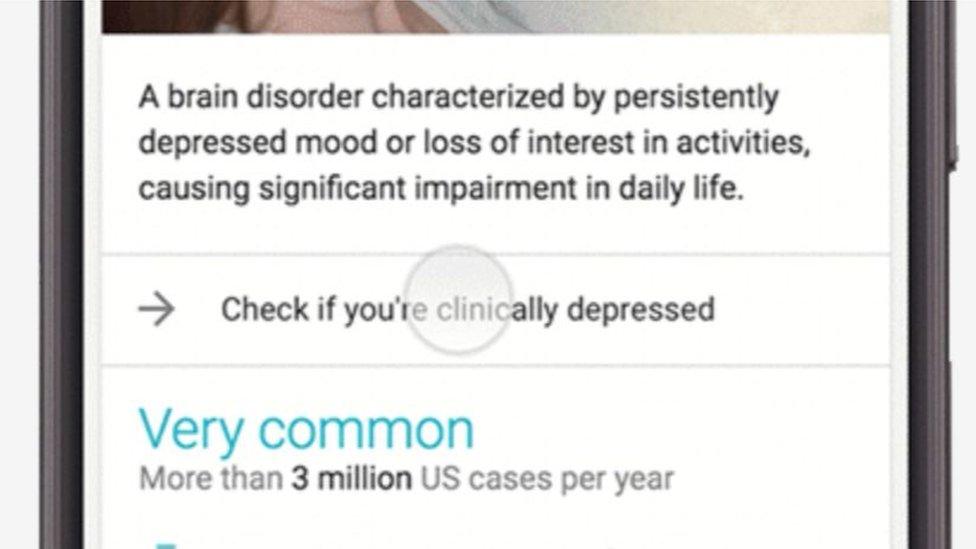Google will ask: 'Are you depressed?'
- Published
- comments

An option to take the test wlll appear in the 'knowledge panel' atop Google searches on mobile
People searching for “depression” on Google will soon be prompted to take a questionnaire to assess if they may be suffering from the illness.
The search giant has partnered with the US National Alliance on Mental Illness (Nami) to roll out the project which is currently only for US users.
Users searching for depression will be prompted to “check if you’re clinically depressed”.
“While this tool can help, it’s important to note that PHQ-9 is not meant to act as a singular tool for diagnosis,” Nami said.
In a blog post announcing the news, external, Nami said the test should not be seen as replacing the insight of qualified mental health professionals - was instead a method to help people get the right help more quickly.
"By tapping “Check if you’re clinically depressed,” you can take this private self-assessment to help determine your level of depression and the need for an in-person evaluation,” the organisation explained.
"The results of the PHQ-9 can help you have a more informed conversation with your doctor."
'Trouble concentrating?'
The question will appear in the Knowledge Panel - the box that appears at the top of results when users search on a mobile device. Typically this panel is used for factual information, including details drawn from Wikipedia entries.
The Patient Health Questionnaire-9 is a series of nine questions about the subject’s mental health.
It asks how often you feel you have “little interest or pleasure in doing things” or “trouble concentrating on things, such as reading the newspaper or watching television?”.
Various studies have concluded it is a concise, reliable way to accurately detect signs of clinical depression.
Speaking to the Financial Times, external, Google product manager Vidushi Tekriwal said users who fill out the test will not have their answers logged by the company, nor would advertising be targeted to them as a result.
However, one psychotherapist said the idea seemed "terribly redundant".
Someone googling depression will probably not find more useful information via a short diagnostic than they have already surfaced in search results, argued Dr Aaron Balick, author of "The Psychodynamics of Social Networking".
"A better approach would be some sort of acknowledgment that the searcher may be feeling down, and offering them resources and a direct line - perhaps a chat box - to local psychological services," he told the BBC.
___________
Follow Dave Lee on Twitter @DaveLeeBBC, external
You can reach Dave securely through encrypted messaging app Signal on: +1 (628) 400-7370
- Published19 May 2017

- Published30 August 2016
